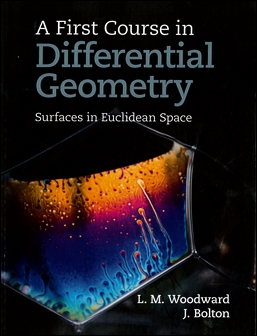書籍分類

A First Course in Differential Geometry: Surfaces in Euclidean Space
作者:Lyndon Woodward, John Bolton
原價:NT$ 880
ISBN:9781108441025
版次:1
年份:2019
出版商:Cambridge University
頁數/規格:272頁/平裝單色
參考網頁:A First Course in Differential Geometry: Surfaces in Euclidean Space
版次:1
年份:2019
出版商:Cambridge University
頁數/規格:272頁/平裝單色
參考網頁:A First Course in Differential Geometry: Surfaces in Euclidean Space
內容介紹 目錄 作者介紹
- Description
- Explains some of the main classical highlights of the geometry of surfaces (Theorema Egregium, geodesics, Gauss–Bonnet Theorem) using a minimal amount of theory, while presenting some advanced material suitable for self-study at the end
- Builds up geometric intuition by providing many examples to illustrate definitions and concepts, and drawing analogies with real-life experiences
- Includes many exercises at the end of each chapter. Students can challenge their understanding of the contents through problem solving, and brief solutions are given to about a third of the exercises
Differential geometry is the study of curved spaces using the techniques of calculus. It is a mainstay of undergraduate mathematics education and a cornerstone of modern geometry. It is also the language used by Einstein to express general relativity, and so is an essential tool for astronomers and theoretical physicists. This introductory textbook originates from a popular course given to third year students at Durham University for over twenty years, first by the late L. M. Woodward and later by John Bolton (and others). It provides a thorough introduction by focusing on the beginnings of the subject as studied by Gauss: curves and surfaces in Euclidean space. While the main topics are the classics of differential geometry - the definition and geometric meaning of Gaussian curvature, the Theorema Egregium, geodesics, and the Gauss–Bonnet Theorem - the treatment is modern and student-friendly, taking direct routes to explain, prove and apply the main results. It includes many exercises to test students' understanding of the material, and ends with a supplementary chapter on minimal surfaces that could be used as an extension towards advanced courses or as a source of student projects.
分類位置:
理工 > 數學/微積分 > 微分幾何


